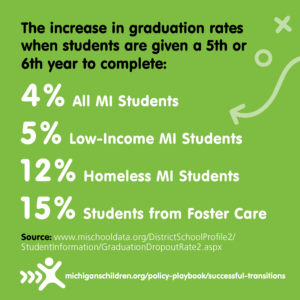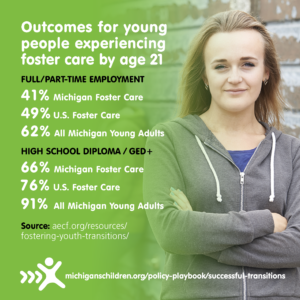The economic success of Michigan depends on getting all Michigan children ready for post-secondary education, work, and life, but too many young people aren’t succeeding through traditional high school graduation routes, and many need more time or different paths to reach a diploma. In addition, many young people, including youth who have spent time in foster care or the juvenile justice system, or those who have been homeless, face barriers to graduation that education alone cannot remove. Maintaining support through young adulthood is even more critical for young people facing these kinds of challenges, and services should be available regardless of age or geography, with access based instead on skill building and successful outcomes.
Successful Transitions – test

Our Recommendations for Successful Transitions
Providing Stability
Ensuring that young people who shoulder significant burdens have some stability in their lives and education, coupled with trauma-informed services and opportunities to get ahead, will result in more supportive relationships, fewer criminal justice records and better educational, career and life outcomes.
- Expand the Michigan EITC for young people who have experienced foster care by lowering the minimum age to 16 and basing the credit on combined federal and state EITC amounts.
- Fully fund programs and coordinated services through the Michigan Youth Opportunities Initiative to put youth in foster care, who may take longer to get through high school and often have fewer home supports in their transition, on a path towards life success.
- Remove barriers to the ability to drive for youth in transition from foster care, including barriers to acquiring auto insurance or a state ID or driver’s license.

- Improve legal representation for children, youth and caregivers in the foster care system through consistent support of Legal Guardians Ad Litem (LGALs) by utilizing available federal match, expanding state funding, as well as increasing training and documentation requirements for courts.
- Expand Court Appointed Special Advocates (CASA) representation for older youth in foster care by piloting the National CASA Fostering Futures initiative, which targets transitioning youth, in at least three localities. Use this pilot to determine appropriate ways to layer support through this initiative and Michigan Youth Opportunities Initiative (MYOI).
- Continue and expand state support for services for youth experiencing or at risk of homelessness or runaway and their families, including a significant population of youth who have experienced foster care, so that youth can access services anywhere in the state.
Preparing for Postsecondary Training and Careers
It is universally accepted that some postsecondary training is essential to access family-supporting jobs. Not surprisingly, postsecondary paths are even less accessible to young people who have struggled through high school, who may be coping with trauma stemming from previous instability, and who may continue to need financial and other support to succeed.
- Expand state support for, and reform eligibility for, the Fostering Futures Scholarship, which provides college tuition, room, and board, and supplies to youth who spent time in foster care. This scholarship needs to more flexibly layer onto other assistance programs and could be expanded to serve more young people in need.
- Improve inter-agency coordination to ensure that complete records of accumulated credits and service needs, including Individualized Education Plans, are maintained for students experiencing foster care and follow youth wherever they go.
- Craft strong and independent mechanisms for grievance and oversight within the Michigan foster care system, including by expanding access to child welfare complaints and corrective actions taken for independent evaluators; mandating public responses from MDHHS and appropriate Courts to all recommendations made by Foster Care Review Boards; and other reforms that would strengthen provisions of the Foster Child and Parent Bills of Rights.
- Strengthen the recently passed Children’s Assurance of Quality Foster Care Act by adding reporting requirements about child welfare complaints and corrective actions taken. Make these available to an independent evaluator like the Foster Care Review Boards to ensure that the voices of citizens in the system are fully acknowledged.
- Improve collaboration between school districts and Michigan Rehabilitation Services to ensure the completion of Individualized Education Plans for older high school students and the appropriate transfer of student records to post-secondary providers.
Many of the same proven solutions for supporting students will also help young adults transition into postsecondary education and a career:
- Continue to redesign K-12 funding to reflect individual student needs, and increase expectations to ensure that funds are being utilized, through in-school or community-based strategies, to address service needs for student populations who have the lowest graduation rates, including students experiencing foster care, homelessness, juvenile justice, and disability. Coordinating academic, health, and other services between schools, service providers, parents, and community partners for students can remove barriers to learning that one system alone can’t solve.

- Preserve and expand state support for adult education programs that provide opportunities for young adults to build literacy skills, earn a GED, and prepare for a career, improving workforce participation and family literacy rates.
- Preserve and expand state support for competency-based education and flexible paths to graduation which provide flexible scheduling, smaller classes, alternative credit-bearing options, and post-secondary pathways to students who may struggle to achieve and graduate due to their personal circumstances.
‘Critical Issues’ for Successful Transitions
Take a Deeper Dive and explore these Issues Briefs by Michigan’s Children.
‘Spotlights’ on Successful Transitions
Learn how public policy decisions impact Michigan families and their children in these Spotlight stories and other reports by Michigan’s Children.
- Agencies Serving At-risk Youth Seek Greater State Support to Battle Homelessness (PDF file)
- Youth with Disabilities Seek College Success – with a Little Help (PDF file)
- Maintaining Successful Connections for Older Youth with Special Needs (PDF file)
- Young Adults from Foster Care ‘Shadow’ Lansing Legislators in Inaugural Foster Care Shadow Day (webpage)
- Wayne State Foster Care KidSpeak (webpage)
In the Win Column: Building on Our Successes
- State support to fully staff Michigan Youth Opportunities Initiative and can be fully leveraged by fully supporting the range of MYOI programs and services.
- Improved legal protections for children, youth, and families in the foster care system through the Children’s Assurance of Foster Care Quality Act. However, for the Act to be fully realized, Michigan requires improved accountability mechanisms within the department and investments in representation for the youth’s interests when important decisions are being made.
- Small amounts of state funding for services for runaway and homeless youth have allowed programs to plug some critical holes, but more funds are needed to rebuild this safety net statewide.
- Recent federal action to expand age eligibility for Earned Income Tax Credit from 25 to 18, with one year lower for youth experiencing foster care, has been a critical step towards enabling youth experiencing foster care to access the EITC.
- Michigan did expand funding for Court-Appointed Special Advocates (CASAs), to provide stable voices for child interests throughout their time in foster care, a support which must be continued with state funds.
